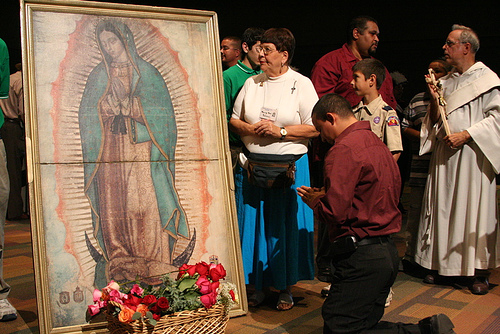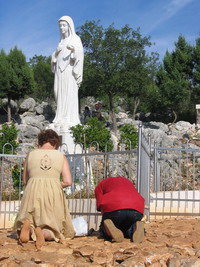Is Mary really the Mediatrix of all Graces?
NO!
Biblical Evidence against Mary as Mediatrix of all Graces
First, let’s start with the Biblical
evidence against Mary being the Mediatrix of all Graces.
Because the average life-expectancy
of the 1st century society in relation to the New Testament was
probably around 20-25 years, it’s fairly reasonable to conclude that Mary died
before most of the later New Testament books were written. With this in mind,
it’s fascinating to observe that when these New Testament books talk about the
subject of the application of heavenly Grace, they invariably declare that it
comes from God, never Mary. For instance, Scholars date the Book of Revelation
after 66 A.D. In fact, most of these later New Testament books are around 90 to
95 A.D. Now, if Rome is correct that Mary should have been applying grace to
all men around this time, the fact remains that Revelation 1:4 states that
grace is given by God, not Mary.
“Grace to you and peace from
Him who is and who was and who is to come” (Rev. 1:4)
Furthermore, the Second letter of
John was at some point written after 80 A.D. And this Epistle also attests to the
fact that Grace comes from God the Father and Jesus Christ, not Mary.
“Grace, mercy and peace
will be with us, from God the Father and from Jesus Christ, the Son of the
Father, in truth and love.” (2 John 1:3)
Moreover, Scripture says that there is only One Mediator.
“For there is one God and one Mediator between God
and men, the Man Christ Jesus” (1 Tim.
2:5)
Catholics will object to this, saying that just because the
verse says “One Mediator”, doesn’t mean that no one else can participate in the
mediation. So there are lesser mediators such as Mary and the saints
participating in mediation.
Well let’s allow this logic and apply it not just to the
“One Mediator”, but to the “One God”. By the Catholics logic, we can say that
just because there’s “One God”, doesn’t mean that no one else can participate
in Deity. Therefore, there are lesser
gods participating in God’s deity.
You see how the Catholic’s logic fails. Scripture plainly and emphatically tells us that there is only one true
God (Deut. 4:39; 6:4) And Scripture
plainly and emphatically tells us there is only
one true Mediator, and there is no other.
Similarly, Acts 4:12 declares, “Nor is there salvation in any other, for there
is no other name under heaven given among men by which we must be saved.” There
is only one name and there is only one Mediator, and that is Jesus Christ. Yet,
the Catholic Church blasphemously proposes another mediator.
One must understand that the reason why Jesus is our only
Mediator is because He has a basis upon which to mediate, and that basis for
mediation is that He shed His blood on our behalf. Thus, when Jesus mediates
for us He has a basis upon which He intercedes for us, and that is what He did
on the Cross. Jesus Christ is our only Mediator because He alone died and made
restitution for our sins. He died as our perfect substitute. He bore our sins
in His body upon the tree. Mary and the saints have absolutely no basis upon
which to mediate. Mary did not bear my sins in her body. And even the Catholics
admit that everything that Mary and the saints have they have from Christ.
Therefore, since they cannot be mediators in the sense that Christ is, they
cannot participate in Christ’s one mediation, and thus, they cannot mediate for
us.
Hence, Mary is NOT the Mediatrix of all Graces.
As a further matter, in order for
Mary to be capable of applying grace to billions of believers across the world
at the same time, without interruption until the end of the world, as Vatican
II claimed, she would need to be capable of being in various places simultaneously.
Only an omnipresent being can be present everywhere at the same time. Yet, only
God has the divine attribute of Omnipresence (1 King 8:27). Mary would also
have to know who to give grace to, which means that she would have to be
omniscient. Yet, only God has the divine attribute of Omniscience as well (1
John 3:20). Mary would also need to be powerful enough to apply grace to all
believers across the earth simultaneously. And yet, only God has the divine
attribute of Omnipotence (Job 42:2).
By declaring Mary as the Mediatrix
of all Graces, Catholics end up ascribing to Mary divine attributes that God
alone possesses and that serves to glorify God alone.
It should also be noted that in Catholic theology there is
this principle idea that Mary is close to Jesus because she’s the ark, the
vessel that gave birth to Him. It’s because of this concept that Catholics are
taught to pray to Mary because she can speak to Christ for us, since she is His
mother, and thus, is closer to Him than we are. This Catholic notion is
completely false because Jesus Himself said in Matt. 12:48-50 that those who do the will of the Father are His
brother, sister, and mother to Him. Therefore, Mary is no closer to Jesus than
we are by the Blood shed for us on the Cross.
Our Lord Jesus Christ said in Matt. 11:28, “Come to Me,
all you who labor and are heavy laden, and I will give you rest.”
And the Apostle Paul teaches us in Heb. 7:25 that Jesus “is also able to save to the uttermost those who come to God through Him, since He always lives to make intercession for
them”
And in Rom. 10:13
we are taught that “whosoever shall call upon the name of the Lord shall be
saved”
Hence, Scripture teaches us that we can go directly to Jesus
Christ since He is our ONE and ONLY Mediator. This is the very reason why Jesus
came into this world, to save all of us from our sins and give us Eternal Life
through Him alone. There is ABSOLUTELY NOTHING in Scripture that talk of a
Co-Mediatrix of all Graces with Jesus. There are no two mediators. Just ONE!
And there is no need for another mediator. Scripture clearly does NOT teach nor
has it EVER taught that we somehow need to come to the Father through Jesus via
Mary.
Historical Evidence against Mary as Mediatrix of all Graces
Now, we look at the historical evidence that Mary is NOT
the Mediatrix of all Graces.
In analyzing the disciples of the
Apostles, the Apostolic Fathers, we find no indication that they thought Mary
applies all graces to humanity from heaven. It’s the same situation when we
look at the 2nd century apologists as well as later generations of
Church Fathers. According the HarperCollins Encyclopedia of Catholocism,
this doctrine is first found in the “late
medieval era”. Catholic Scholar Ludwig
Ott acknowledges that “Express
testimonies, though few in number, to Mary’s position as mediatrix of grace are
found since the eighth century” (Fundamentals of Catholic Dogma, p. 214).
As stated by Ott, it’s not until about 700 years after Christ’s death that people
begin to assert that Mary is mediatrix of all graces. Even the Patristic
Scholar, J.N.D. Kelly, agrees that “centuries had to elapse before the
doctrines of...her position as intercessor and mediator...could become elements
in the day-to-day faith of Catholic Christians” (Early Christian Doctrines, p.
499).
Not only did none of the Patristic
Fathers bear witness to this doctrine, proving that the Apostles never passed
on this teaching to the Church for all to believe in, but many Patristic
Fathers have testified to holding beliefs contrary to this teaching. These
Fathers clearly taught that it’s God that gives grace to men, not Mary.
For instance, Clement of Alexandria stated, “For
it were truly monstrous that that which is not complete should be called a gift
(or act) of God’s grace. Being
perfect, He consequently bestows
perfect gifts.As at his command all things were made, so on His bare wishing to
bestow grace, ensures the perfecting
of His grace” (The
Paedagogus, Book I, 6).
Likewise, John Chrysostum said, “For
the whole is of God who wills to bestow
upon many, so that the grace may
appear the greater” (Homily 9 on 2
Corinthians)
Moreover, Jerome declared, “It Has been
established that the Lord, by the same
grace wherewith He bestowed upon us free choice, assists and supports us in our individual actions” (Against
the Pelagians, Book III, 6)
In John’s Gospel Chapter 17 our Lord
Jesus Christ proclaims, “And this is
eternal life, that they may know You, the only true God, and Jesus Christ whom
You have sent.” (John 17:3). This statement sums up
everything we need to know for our eternal salvation and eternal life. To know
our Lord Jesus Christ is to know the only true God. Hence, there is no need of
Mary for eternal life since our Lord Jesus himself never mentions her anywhere
in Scripture concerning eternal life.
Discussing on the medieval Roman misuse of Luke 1:28
in order to support this false doctrine, Church Historian, Alister Mcgrath, said it was disproven by the Catholic Scholar Erasmus saying, “According to the
Vulgate, the angel Gabriel greeted Mary as ‘the one who is full of grace’ (gratia plena) (Luke 1:28), thus
suggesting the image of a reservoir full of grace, which could be drawn upon at
a time of need. But as Erasmus pointed out, the Greek simply meant ‘favored
one,’ or ‘one who has found favor’. Mary was one who had found God’s favor, not
necessarily one who could bestow it on others. Once more, an important feature
of medieval theology seemed to be contradicted by humanist New Testament
scholarship” (Historical Theology: An Introduction to the History of Christian
Thought, p. 97)




